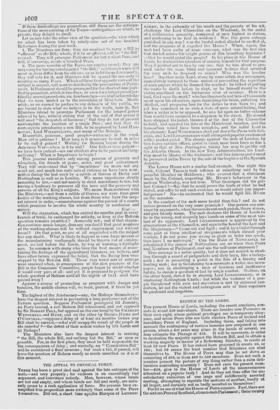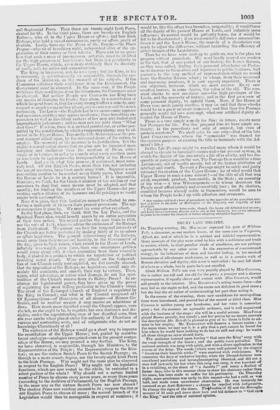REFORM OF THE LORDS.
THE present House of Lords, including the recent creations, con- sists of about 420 individuals. There are besides nine Peeresses in their own right, whose political privileges are in temporary abey- ance, and seven Peers who are both elective Peers of Ireland and hereditary Peers of England. Including these, and taking into account the contingency of various honours now conjoined in one person, which a few years may place in the hands of several, we may estimate the Peerage at 450. It will be necessary, in order to neutralize the majority against the Reform Bill, and to obtain a working majority in favour of a Reforming Ministry, to create at least 50 new Peers. It has indeed been proposed to create 80, or 100; but 50 seems the least number that Ministers can stint themselves to. The House of Peers may thus be set down as consisting of 480, or from 480 to 500 members. Does not such a number present the picture of any thing rather than a calm deli- berative controlling assembly ? Does not even the present num- ber-420, give to the House of Lords all the inconveniences attendant on a popular body ? And do they not thus offer the une satisfactory exhibition of one large and indifferently assorted. meeting, attempting to regulate the motions of another, hardly at all larger, and certainly not so. badly assorted as themselves? Forlet us see of what the House of Peers consists. First,there are the sixteen Peers osacotlan4elasen each Parliament ; these. weeny
call Septennial Peers. Then there are twenty-eight Irish Peers, elected for life. In the third place, there are twenty-six English
Bishops, who sit in the Upper House ex officio ; and four Irish Bishops, who hold a mixed commission, partly ex officio, partly of election. Lastly, there are the Peers of the Empire—the Peers Proper—who sit of hereditary right, independent alike of the ap- probation of their master or their fello,.vs. There can be no ques- tion that such a mass of incongruous :materials must he ill fitted
for the high purposes of legislation : but there is a peculiarity in the Upper House, which, even more strikingly than its diversity of parts, calls for notice and animadversion.
The King, in his person, can do no wrong; but the King, in his government, is constitutionally as responsible, through the me- dium of his MiniSters, as the meanest of his subjects. If the
Commons withdraw their confidence from the Government, the Government must be changed. In the same way, if the People
withdraw their confidence from the Commons, the Commons must be chenged. But neither People nor Commons nor King have any means of changing the Peers ; they alone, in a constitution of which the great boast is, that for every wrong it offers a remedy, may cormnit as much wrong as they please, and no one can call them to a reckoning. The Lords—the English Lords we mean—may approve bad measures, and they may oppose good ones ; these hereditary ex- pounders as well as hereditary makers of law may give foolish and impracticable judgments ; and no man can say unto them " What dost thou ?" It is true, there is a method pointed out, or rather per- mitted by the constitution, by which a temporary change may be ef- fected in the Upper House. This method the Sovereign is at the pre- sent moment called upon, by the universal desire of the nation, to employ. The necessity of the measure is its justification. Yet the slightest consideration shows that no plan can be imagined more
bungling and inefficient than the creation of Peers, either singly or in batches, in order to remedy what every creation more or less tends to aggravate—the irrespon8Ailif y of the House of Lords. And see to what this process, if continued, must natu- rally lead. Of 350 English Peers, more than 120, not including the recent creations, have been made since 1300. Suppose a cor- responding number to be created every thirty years, what would the House of Lords be in a century hence ? It is impossible, therefore, we think, for the blindest admirer of the wisdom of our ancestors to deny that some means must be adopted, and that speedily, for limiting the numbers of the Upper House—for pre- venting such a dilution of its honours and its privileges as would render both contemptible.
Now it is plain, that this limitation cannot be effected by con- ferrMg a monopoly of titles on their present possessors. The age of monopolies is gone by. We must try some other expedient. In the first place, then, we think that the Lay Peers, and the .Spiritual Peers also, would benefit much by an entire separation of their two orders. We regard neither the sore trials in 1688, nor the vote of 1831, when we advise the exclusion of the Bishops from Parliament. We cannot see how the temporal interests of the Church are better protected by making thirty of its members ex officio legislators. The general subserviency of the Bishops, much more than their occasional hostility, to the Government of the day, gives to their voices, when raised in the House of Lords, infinitely less weight, even there, than one unanimous petition would carry along with it when emanating from their venerable body, if placed in a position to which no imputation of political truckling. could attach. Were any attack on the temporali- ties of tile Church really contemplated, we feel morally assured, that the opposition of the Bishops, as legislators, would only sti- mulate the assailants, and smooth their way to victory. Then, again, what advantage, or rather what damage, do not the spiri- tualities of the Church receive from its Bishop Peers ? In ex- change for legislatorial power, they have given up the power of regulating the most trifling particular in the Church's ritual. The ritual of the Episcopal Church of England is regulated by the King in Council ; and what is the Council composed of? Of Episcopalians—of Dissenters of all classes—of Roman Ca- tholics, and in another session it may receive an admixture of -Jews. How much more dignified would the Church appear, were she left, as she ought to be, to regulate her own doctrines and dis- cipline, under the superintending care of her dignified sons, than she ever canbe when placed under the authority of Christians of various and contending sects, and of religionists who do not ac- knowledge Christianity at all
The exclusion of the Bishops would go a short way to improve the constitution of the Upper House ; but, guided by constitu- tional analogies—analogies recognized even in the present compo- sition of the House, we may proceed a step further. The King, we have observed, is responsible, through his Ministers, to the Representatives of the People ; the Representatives to the Elec- tors; so are the sixteen Scotch Peers to the Scotch Peerage ; so, though in a more remote degree, are the twenty-eight Irish Peers to the Irish Peerage. Why might not the same plan be observed in respect to the English Peers ? Why might not the legislative functions, which are now vested in the whole, be restricted to a select portion of the whole? Why should not a certain limited number of Peers be chosen every seven years, or every threeyears (according to the duration of Parliament), by the English Peerage, in the same way as the sixteen Scotch Peers are now chosen ? The elective Peers now existing amount to 34 ; suppose the 350 or 400 English Peers to choose 66 more ; the second branch of the Legislature would then be manageable in respect of numbers; it would be, like the other two branches, responsible; it would have all the dignity of the present House of Lords, and infinitely more influence ; its control would be patiently borne, for it would be felt to be disinterested ; if an irreconcilable difference occurred be• tween it and the Lower House, the remedy of a dissolution was ready to adjust the difference, without hazarding the efficiency of either branch of the Legislature.
Thus far we have sure analogy to guide us, nor is the plan we propose without precedent. We need hardly remind our readers of the fact, that at one period of our history, the Lesser Barons, as they were called, finding their personal attendance on Parlia- ment onerous to themselves and injurious to public business, hail recourse to the very method of representation which we would have the Greater Barons adopt ; to Nvhom, from their increased and increasing- numbers, it is now equally expedient. There is one objection, however, which we must answer. Every new creation lessens, in some degree, the value of the old. The con- stant checks to new creations are—the high privileges of the Lords, and the necessity of fortune, and in the first possessor of some personal dignity, to uphold them. Now, if the House of Peers were made purely elective, it may be said that these checks would be in a great measure removed ; and that thus the Peerage contempt, generally would fall into c t npt, whatever artificial dignity at- tended the House of Peers.
There is a very simple remedy for this ; in future, create none but Peerages for life. For this proposal also we have ample au- thority, in the precedents not only of ancient, but even of modern creations.* We shall refer to one only—that of the late• Lord COLLINGWOOD, where the " remainder " was framed for the express purpose of causing the title to terminate with the Ad- miral's life: i In this Life Peerage might be enrolled many whom it would be absurd to elevate to baronial honours under the present system, in which the dignity of the sire entails a life of inactivity, and too fre- quently of pauperism, on the son. The Peerage then would be a true Aristocracy, not of wealth merely, but of the higher attributes of intellect and worth. To such a Peerage might be safely and justly. intrusted the election of the Upper House ; for of what would that Upper House in such a case consist ?—of the elite of all that was goad, respected, prudent, honourable, in the State ; an assembly of the wise — a true Wittenagemote — to whose decisions the People must affectionately and reverentially bow ; for its electors,. ennobled because already noble in themselves, would be men to whom the People loOked up with affection and reverence.
• Our readers will find a host of precedents in the appendix of the pamphlet enti- tled .4 Letter to the Duke of Wellington on the Propriety and Legality of Life Peerages. t The remainder was to heirs male, though the brave old Admiral bad no son ; and Lady COLLINGWOOD, thutush not so old as her husband, was so far advanced in years as to render the chances of future offspring altogether hopeless.



























 Previous page
Previous page